|
|
|
Sort Order |
|
|
|
Items / Page
|
|
|
|
|
|
|
| Srl | Item |
| 1 |
ID:
132358
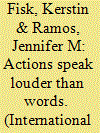

|
|
|
|
|
| Publication |
2014.
|
| Summary/Abstract |
How and to what extent is the preventive use of force becoming the future of foreign policy for states around the world? We explore the spread of preventive logic to increasing numbers of states and examine the degree to which an international norm toward preventive self-defense is cascading in the international system. Through content and comparative case study analysis, we investigate leaders' rhetoric and security policies concerning what we theorize is the key indicator of a country's emulation of the United States: assertion of the right to the unilateral, preventive use of force outside of its borders. Our evidence indicates that there has been a shift away from the established international norm-which considers the use of preventive force illegal and illegitimate-toward growing acceptance of unilateral preventive strategies, a shift largely propelled by the precedents set by the United States in the war in Iraq and its use of unmanned aerial vehicles (UAVs or drones) in the global war on terror. Our findings also reveal that some states are applying the strategy of preventive self-defense beyond the use of UAVs for targeted killings to the extreme contingency plan for nuclear war. We conclude by discussing possibilities for further research and considering the implications of this phenomenon.
|
|
|
|
|
|
|
|
|
|
|
|
|
|
|
|
| 2 |
ID:
172979
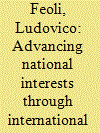

|
|
|
|
|
| Summary/Abstract |
Ludovico Feoli comments on a small Central American state’s approach to maximising its international diplomatic projection.
|
|
|
|
|
|
|
|
|
|
|
|
|
|
|
|
| 3 |
ID:
147693
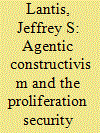

|
|
|
|
|
| Summary/Abstract |
Recent developments in global politics and international relations theory have raised questions about the strength of international norms. Critical constructivists identify instances of norm change, contestation, and even regress, arguing that norms may be less deeply internalized and more fragile than often assumed. This study builds on contemporary constructivist scholarship to advance a model of elite-driven norm change with stages of redefinition and substitution through contestation. It conducts a plausibility probe of the model by analyzing the development of the Proliferation Security Initiative, the US-led program that appeared designed to change normative principles from non-proliferation to counter-proliferation and from freedom of navigation on the high seas to maritime interdiction of suspect weapons and technology shipments. The model lends valuable insights on the evolution of norms to accommodate new realities over the last decade, and it suggests the need for more contingent and multi-linear theories of international cooperation.
|
|
|
|
|
|
|
|
|
|
|
|
|
|
|
|
| 4 |
ID:
178326
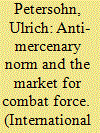

|
|
|
|
|
| Summary/Abstract |
Since 2013, combat services have been increasingly exchanged on the market. This development is puzzling since the practice emerged despite an anti-mercenary norm banning such services, and without any revision of the norm. The article argues that the combat market is not a deliberate design, but the result of strategic interaction. For some, compliance with the anti-mercenary norm is the best strategy, while for others, violating the norm is best. However, once the norm violation occurs, it is in the interest of all actors to maintain a façade of compliance. Non-compliant actors benefit from the combat services, and compliant actors do not have to engage in costly sanctioning of the norm violation, and avoid the reputational costs associated with non-enforcement. The article employs game theory to investigate the strategic interactions of actors across eleven combat contracts from 2013 to 2019.
|
|
|
|
|
|
|
|
|
|
|
|
|
|
|
|
| 5 |
ID:
152945
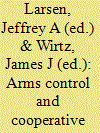

|
|
|
|
|
| Publication |
New Delhi, Viva Books, 2011.
|
| Description |
xiv, 288p.hbk
|
| Standard Number |
9788130915302
|
|
|
|
|
|
|
|
|
|
|
|
Copies: C:1/I:0,R:0,Q:0
Circulation
| Accession# | | | | | | | | | | | |
| 059059 | 355.02/LAR 059059 | Main | On Shelf | General | | | | | | | |
|
|
|
|
| 6 |
ID:
087994
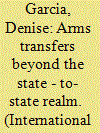

|
|
|
|
|
| Publication |
2009.
|
| Summary/Abstract |
Arms transfers beyond the state-to-state realm can have harmful effects for international security dramatically affecting the relations and behavior of states. This article examines why an emerging international norm on "prohibiting states to transfer arms to nonstate groups" has failed to diffuse at the international level. It discusses the already available international law framework existing at the regional and international levels upon which the potential norm could be built. The failure of the norm to diffuse at the international level can be primarily explained by the existence of a long-consolidated norm: the customary practice of states to transfer weapons to nonstate actors, that is, groups they deem legitimate to, without any interference or constraint.1 The unrestrained transfer of weapons is an established foreign-policy practice. It is the way states form, uphold alliances, extend friendships, and build spheres of influence (Sorokin 1994). Clearly, no state willingly wants to give this up. Therefore, the multilateral agreement on a norm barring most or all transfers of weapons to nonstate actors would curtail the freedom of action to build spheres of influence as states please. There are genuine ethical and moral dilemmas in this discussion, a nonstate actor may be a freedom fighter or a terrorist depending on different perspectives. The distinction between the categories "state" and "nonstate" actors may risk classifying actors in two camps: the good and the bad, respectively. This is problematic as a few states are known to be the most brutal perpetrators of egregious violations against their own citizens, whereas certain nonstate actors are legitimately fighting for the protection of vulnerable populations.
|
|
|
|
|
|
|
|
|
|
|
|
|
|
|
|
| 7 |
ID:
197119


|
|
|
|
|
| Summary/Abstract |
AI-enabled systems will steadily infiltrate resort-to-force decision making. This will likely include decision-support systems recruited to assist with crucial deliberations over the permissibility of waging war. Potential benefits abound in terms of enhancing individual and institutional capacities for cognition, analysis, and foresight. Yet, I argue that we have reason to worry. Our interaction with these systems – as citizens, political and military leaders, states, and formal organisation of states – would also court significant risks. Specifically, reliance on decision-support systems that employ machine-learning techniques would threaten to undermine our adherence to international norms of restraint in two distinct ways: (i) by creating the reassuring allusion that these AI-driven tools are able to replace us as responsible agents; and (ii) by inserting unwarranted certainty and singularity into complex jus ad bellum judgements. I will refer to these challenges as the ‘risk of misplaced responsibility’ and the ‘risk of predicted permissibility’, respectively. If unaddressed, each proposed risk would make the initiation of war appear more permissible in particular cases and, collaterally, contribute to the erosion of hard-won international norms of restraint.
|
|
|
|
|
|
|
|
|
|
|
|
|
|
|
|
| 8 |
ID:
146455
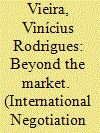

|
|
|
|
|
| Summary/Abstract |
Negotiators expect the World Trade Organization (WTO) to be an arena for states to pursue their material gain. However, the WTO also reflects symbolic aspects of international politics, in particular the notion of multilateralism. Although such a principle, in part, expresses Western dominance, Global South states have also benefited from multilateral regimes, and thus have incentives to legitimize them and behave according to their rules. Will the pattern of multilateralism change as other trade arrangements potentially gain more prominence? This article analyzes actions taken by Brazil and India in WTO’s Doha Development Agenda (DDA) and concludes that the multilateral system of trade will survive as Global South states participate in the organization to seek not just material gains but also to commit themselves to the international normative dimension.
|
|
|
|
|
|
|
|
|
|
|
|
|
|
|
|
| 9 |
ID:
144465
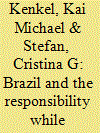

|
|
|
|
|
| Summary/Abstract |
This article examines Brazil's responsibility while protecting (RwP) initiative as an example of norm sponsorship available to nonpermanent members of the Security Council. After setting the stage with Brazil's historical engagement with intervention issues, it discusses the reasons behind the Brazilian initiative. It examines RwP's key proposals and the reactions they generated. RwP's normative implications are discussed, together with an examination of the main reasons why Brazil's sponsorship of the initiative waned following its exit from the Council. Brazil's withdrawal from sponsoring RwP highlights the need for ongoing support for initiatives that seek to revive the international community's intervention practices by tackling the basic tenets of discord over R2P's implementation.
|
|
|
|
|
|
|
|
|
|
|
|
|
|
|
|
| 10 |
ID:
077884
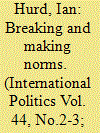

|
|
|
|
|
| Publication |
2007.
|
| Summary/Abstract |
International norms are influential when they are seen as legitimate, and recent American behaviour may undermine the legitimacy of norms on the use of force. I examine three kinds of legitimacy crisis that might arise from American revisionism. First, the US threatens to delegitimate the norms that it challenges, particularly on military preemption. Second, it threatens to undermine its own influence by disassociating American power from one source of legitimation. Finally, it may negate the basic idea of American hegemony as that term is understood in constructivist scholarship and so transform the structure of the international system. Any of these might lead to a crisis, though of different kinds. The American challenge to the customary law on preemption threatens to delegitimize both the existing norms and the social basis of US power, while also attempting to legitimize American interests and new understandings of the norms. It therefore shows the productive and destructive aspects of the power of legitimation in world politics. Legitimation is the link between states and the normative structures of international society
|
|
|
|
|
|
|
|
|
|
|
|
|
|
|
|
| 11 |
ID:
155159
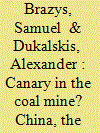

|
|
|
|
|
| Summary/Abstract |
How China assumes its position of superpower is one of the most important questions regarding global order in the twenty-first century. While considerable and sustained attention has been paid to China’s growing economic and military might, work examining how China is attempting, if at all, to influence the ecosystem of global norms is in its earlier stages. In this article we examine China’s actions in an important venue for the development of global norms, the United Nations General Assembly (UNGA). Using a unique dataset that captures how other countries move into or out of alignment with China on UNGA resolutions that are repeated over time, we find statistical evidence that China used diplomatic and economic means in an attempt to subtly alter international norms. We further illustrate these findings by examining four states that made substantive moves toward China on resolutions concerning national sovereignty, democracy, international order, non-interference, and human rights.
|
|
|
|
|
|
|
|
|
|
|
|
|
|
|
|
| 12 |
ID:
197726


|
|
|
|
|
| Summary/Abstract |
The rising tensions in the South China Sea (SCS) have mainly been affected by China's growing confidence in its ability to challenge and redefine norms that constitute the regional structure. In parallel to its continued rise, China faces inevitable pressure to either accept prevailing international norms or, if it challenges existing norms, to provide an alternative source of legitimacy for its behavior. The purpose of this article is therefore to examine China's selection process when it comes to challenging certain norms. The main argument pursued in this article states that from the Chinese perspective, when challenging norms, it is not primarily the content of the challenged norm that matters but the likelihood of successfully shaping a new norm and thus becoming the effective norm-maker in the region.
|
|
|
|
|
|
|
|
|
|
|
|
|
|
|
|
| 13 |
ID:
113974
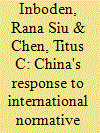

|
|
|
|
|
| Publication |
2012.
|
| Summary/Abstract |
Over the past three decades, the People's Republic of China's response to international human rights pressure has been guided by its strong state identity, an identity that has prioritised the pursuit of economic productivity, material power and international prestige. The goal of a strong socialist state led Beijing to participate in the UN human rights regime for strategic and diplomatic gains, and later to endorse human rights norms that were perceived as consistent with them. Accordingly, the PRC sees colonialism, imperialism, hegemonism, and racism as key human rights violations, while opposing the universality of human rights and rejecting intrusive human rights monitoring, deemed as detrimental to its strong state goal. After the 1989 Tiananmen Square protests, China faced unprecedented international pressure and responded by challenging aspects of the human rights system. During negotiations to replace the UN Commission on Human Rights with the Human Rights Council, China again sought to shield itself from human rights pressure, primarily by challenging country specific approaches. Thus, instead of the normative influence leading to norm-compliant behaviour, China has sought to diminish human rights pressure and shape international human rights institutions in ways that are advantageous to its state interests.
|
|
|
|
|
|
|
|
|
|
|
|
|
|
|
|
| 14 |
ID:
133852
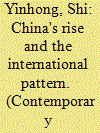

|
|
|
|
|
| Publication |
2014.
|
| Summary/Abstract |
Three basic elements stand out in the international pattern: global power distribution, the system of international norms and the transnational values systems, all of which are of vital importance in the interaction between China's rise and the future international pattern.
|
|
|
|
|
|
|
|
|
|
|
|
|
|
|
|
| 15 |
ID:
121130
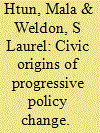

|
|
|
|
|
| Publication |
2012.
|
| Summary/Abstract |
Over the past four decades, violence against women (VAW) has come to be seen as a violation of human rights and an important concern for social policy. Yet government action remains uneven. Some countries have adopted comprehensive policies to combat VAW, whereas others have been slow to address the problem. Using an original dataset of social movements and VAW policies in 70 countries over four decades, we show that feminist mobilization in civil society-not intra-legislative political phenomena such as leftist parties or women in government or economic factors like national wealth-accounts for variation in policy development. In addition, we demonstrate that autonomous movements produce an enduring impact on VAW policy through the institutionalization of feminist ideas in international norms. This study brings national and global civil society into large-n explanations of social policy, arguing that analysis of civil society in general-and of social movements in particular-is critical to understanding progressive social policy change.
|
|
|
|
|
|
|
|
|
|
|
|
|
|
|
|
| 16 |
ID:
169262
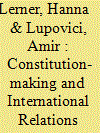

|
|
|
|
|
| Summary/Abstract |
Constitution-making has become an intrinsic component of international politics, nevertheless, international relations scholars largely refrain from theorizing it tending to view formal constitutional drafting as a domestic project. The article proposes an understanding of constitution-making as an international (in addition to national) political phenomenon. We develop a new and comprehensive classification of international influences on constitution-making. We also demonstrate how the empirical study of constitution-making can illuminate overlooked areas of research and challenge existing international relations theories. Our focus here is on the study of international norms. We present three theoretical insights concerning the emergence of international norms, their dissemination, and the role of epistemic communities in facilitating their expansion. We conclude by highlighting how the interaction between international and domestic factors in the crafting of constitutions further challenges the disciplinary distinction between domestic and international politics.
|
|
|
|
|
|
|
|
|
|
|
|
|
|
|
|
| 17 |
ID:
065699
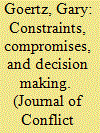

|
|
|
| 18 |
ID:
181669
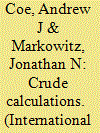

|
|
|
|
|
| Summary/Abstract |
For many centuries, conquest was commonplace, and its attractiveness was central to the character of international politics. Why has it declined? Existing theories cannot explain why powerful countries no longer conquer states with easily extractable wealth. We develop an explanation based on the relationship between a potential conqueror's economic productivity and its ability to profit from conquest. Productivity has opposing effects on conquest's profitability: it raises the opportunity cost of each asset diverted to conquest, but also reduces the quantity of assets required for conquest. The net effect is determined by the composition of investment in innovation. We document that since at least 1950 investment has been predominantly aimed at civilian, not military innovations, so that rising productivity should reduce conquest's net profitability. Using cost analyses of comparable wars, we estimate bounds on the profitability of conquering the oil and gas reserves of the Persian Gulf, a very tempting target, for the United States and Iraq, two potential conquerors of widely differing productivity. Though both mechanisms operate, we find that the net effect of higher productivity is to reduce the profits from conquest. Moreover, this net effect is large enough to render conquest generally unprofitable for contemporary high-productivity states.
|
|
|
|
|
|
|
|
|
|
|
|
|
|
|
|
| 19 |
ID:
072694
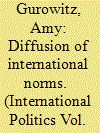

|
|
|
|
|
| Publication |
2006.
|
| Summary/Abstract |
As the literature on international norms grows beyond documenting that norms matter, scholars have increasingly responded to the challenge that they must account for why and when they matter by looking at variation in the impact of those norms across time and place. This article looks at issues surrounding state identity as one understudied factor in determining why norms matter more in some places than others. We know that domestic and international actors often use norms to back-up and make arguments for which they often have few or weak domestic resources. But the context for the use of those norms is important. Mobilization and invocation of international norms domestically occurs within the context of a state's identity and the degree to which those norms are helpful to the actors who use them depends, among other things, on the identity of the target state. This article joins the discussion about norm diffusion by examining two cases involving the incorporation of non-citizens: Germany and Japan. A comparison of these cases suggests that identity and identity crises matter in understanding the differential diffusion of international norms.
|
|
|
|
|
|
|
|
|
|
|
|
|
|
|
|
| 20 |
ID:
166752
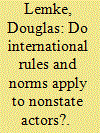

|
|
|
|
|
| Summary/Abstract |
The nonstate actors of interest in this article are territorial contenders: political entities that control populated territory, function like sovereign states but are not recognized as sovereign states by other members of the international system. Sometimes they are de facto states, sometimes they are rebel groups, sometimes they are neither of these, instead existing in control of territory with neither conflict against the sovereign state within whose borders they exist nor claims to a state of their own. New data about territorial contenders permit me to evaluate arguments about changing rules and norms in the international system. I find support for claims about the consequences of changing rules about which actors are recognized as sovereign states but not for claims about a norm against conquest after World War II. In the discussion section, I consider implications of these findings for future research.
|
|
|
|
|
|
|
|
|
|
|
|
|
|
|
|
|
|
|
|
|